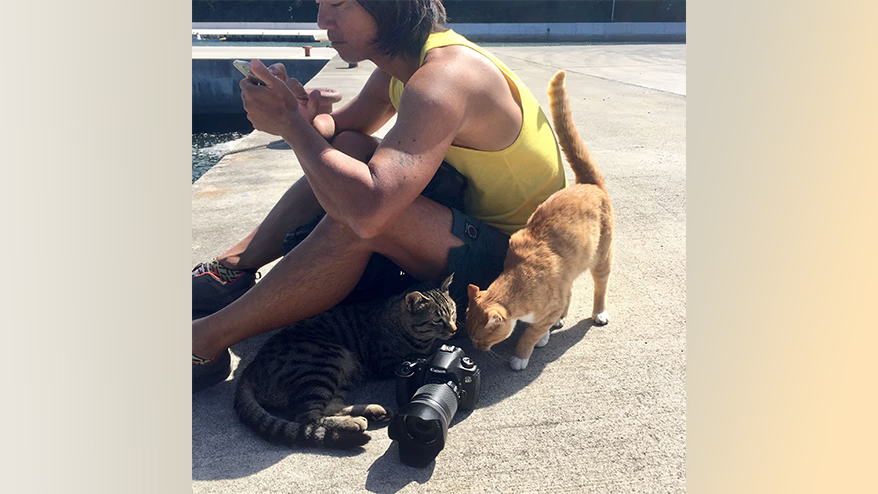あなたの「はたらく」教えて下さい!というタイトルで、私・原澤が気になるひとへ話を聞きに行くコーナー。前回に引き続き、豊嶋秀樹さんへのインタビューです。(表紙は、豊嶋さんがキュレーターを務めたアートイベントの仕事中のひとコマ。会場から会場の移動はランニングだとか。)
前編では豊嶋さんの暮らし方や、どういった経験を経ていまのような暮らし方をしているのか?といった話を伺いました。続いて後編はWORK101の企画『神山ハイキングクラブ』を一緒に進めていくなかで私が感じていた、豊嶋さんが働くうえで大事にしているだろうと思うことを聞いてみました。
フェアに付き合う。持続する関係性
原澤:豊嶋さんと知り合ってまだ数ヶ月ですけど、豊嶋さんは「フェアかどうか」をよく考えていますよね。それってすごい大事なことだなあと思っていて。今回の神山ハイキングクラブの話をしていても豊嶋さんは、参加する人にとって、運営する僕らやモノサスという会社にとって、豊嶋さん自身にとって、それぞれフェアなのかを、すごく大事にしてらっしゃいますよね。
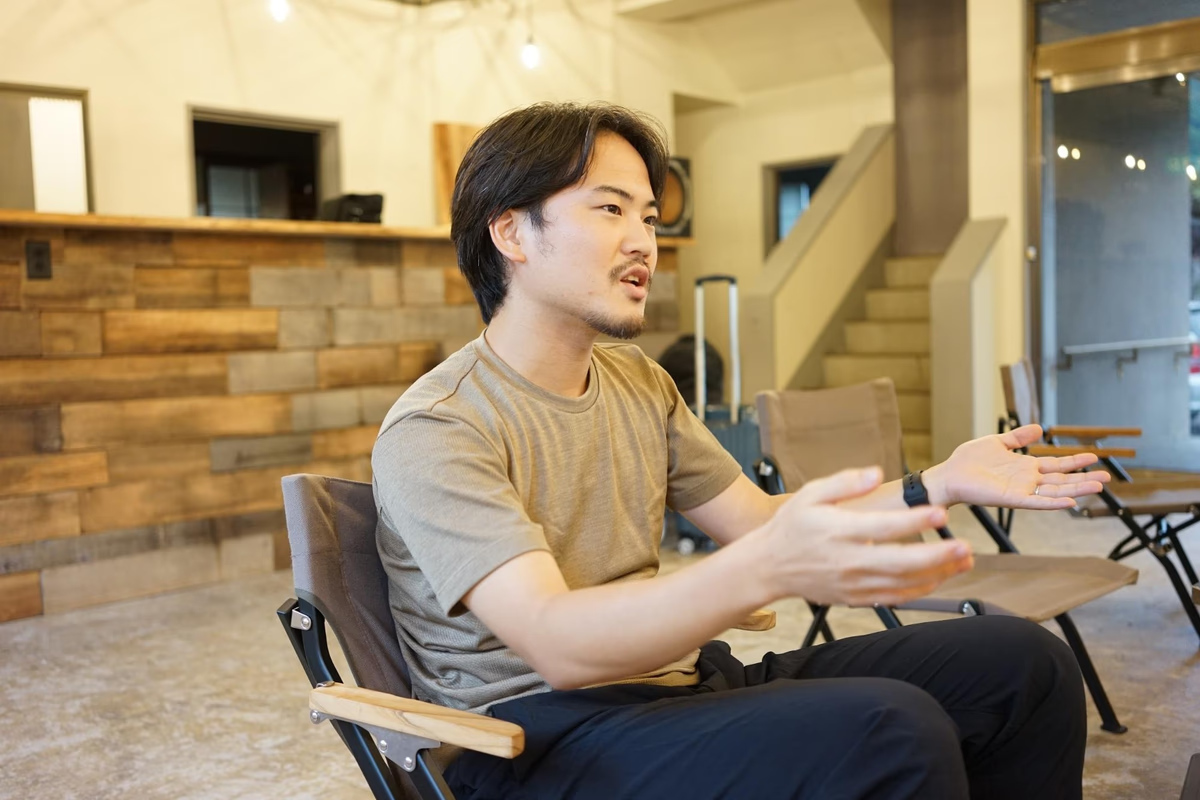
豊嶋:うん、それはほんとにそう思う。いわゆる「仕事」じゃなくても、友達同士でも家族でも、夫婦でもそう。フェアじゃない感じが長く続くのってしんどいと思う。一回くらいならまぁいいかと思うかもしれないけど、ずっと続くと関係自体がなんか持続しなくなっていくでしょ?
だから、今回の『神山ハイキングクラブ』でも、別にモノサスからちょっと稼いでやろうとかまったく思ってないよ、本当に。僕が、モノサスにとってメリットがあることができて、そのメリットのうちから支払えるギャランティを出してくれたら、僕は自分の得意なことをやることで、自分の生業の一部にそれを持っていける。逆に、僕がここに奉仕しに来る理由もない。だから、ここでの交換がきっちりなされていればいいなあっていう思うよね。
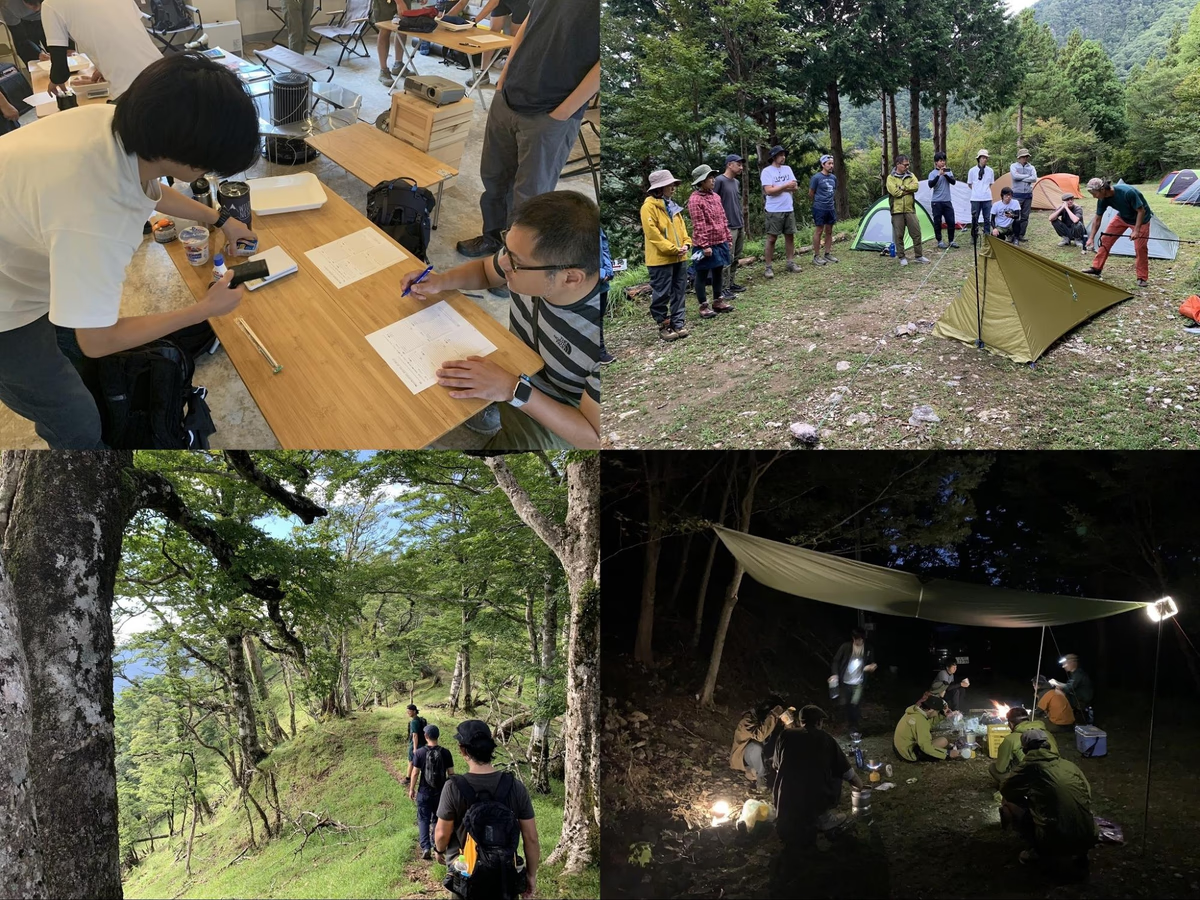
豊嶋さんと企画した「神山ハイキングクラブ」活動の様子
原澤:更に豊嶋さんは、お互いの様子がちゃんと見えていると思いました。ちゃんと見えてるかどうかも大事だと思ってて。下手したら、あまり関係性のない人とか、お客さんとかでもいいんですけど。「お金を渡すからその対価としてなにかサービスを受けます」「お金をもらうから何かものをつくります」みたいな、そこの関係性って本来フェアであるべきなんですよね。メリットのあることをする、だから対価としてギャラが発生しますよっていうのがあるんだけど。なんか、そこって見えなくなりがちというか、難しいところではあるし。よく相手のことを観察しないとなんか間違えてしまいそうな気がします。
豊嶋:うーん、そうねぇ。やっぱり、自分もずるしたくないし、ごまかされるような感じとかも嫌だし。
自分も経営者の一人でやってたときには、少しでも稼いでおきたいと思ってやっていたことはあると思う。みんなに給料を払うためにも、会社を回すためにも儲けられるところでは儲けておきたいって気持ちは持っていたと思う。フリーになって、意識的にそんなにお金のいらない生活をつくれたから、儲けなきゃっていうことを最優先にしなくてよくなった。
原澤:そういうときもあったんですね。
豊嶋:もちろん。そういうのはやっぱりあると思うね、みんな。とくに会社を経営している人とかの場合。
原澤:豊嶋さんも、gm projectsの前はgrafでご自身が経営をやるっていう風になってきたときに、結果的に別の団体にしようとなったって話をされていましたよね。それも、そういうことに関係あるんですか。
豊嶋:んっとそこはね、フェアネスっていうのもあるけれども、ひとつには不毛さを感じたというか。みんなとgrafを始めたのは、ビジネスマンになりたかったわけじゃなくて、クリエイターとしての環境がほしかったから。そこですごい面白い、自分にとっても刺激的なクリエイティブをやりたかったのね。会社が順調に大きくなってくると、自然と経営力が大切になってくるよね。
ただ、アートの分野で普通に稼いでいくっていうのはかなり難しいことでもあったし、僕のビジネス手腕では無理だと思って。それにやきもきしたり腐心したりするよりは、自分は表現に近いところをやったほうが活きるんじゃないかと思った。
だから、ないとは思うけど、もしまた会社をやることになったら、絶対経営能力に長けた、一緒に手を組めるビジネスパートナーと一緒にやりたいと思う。
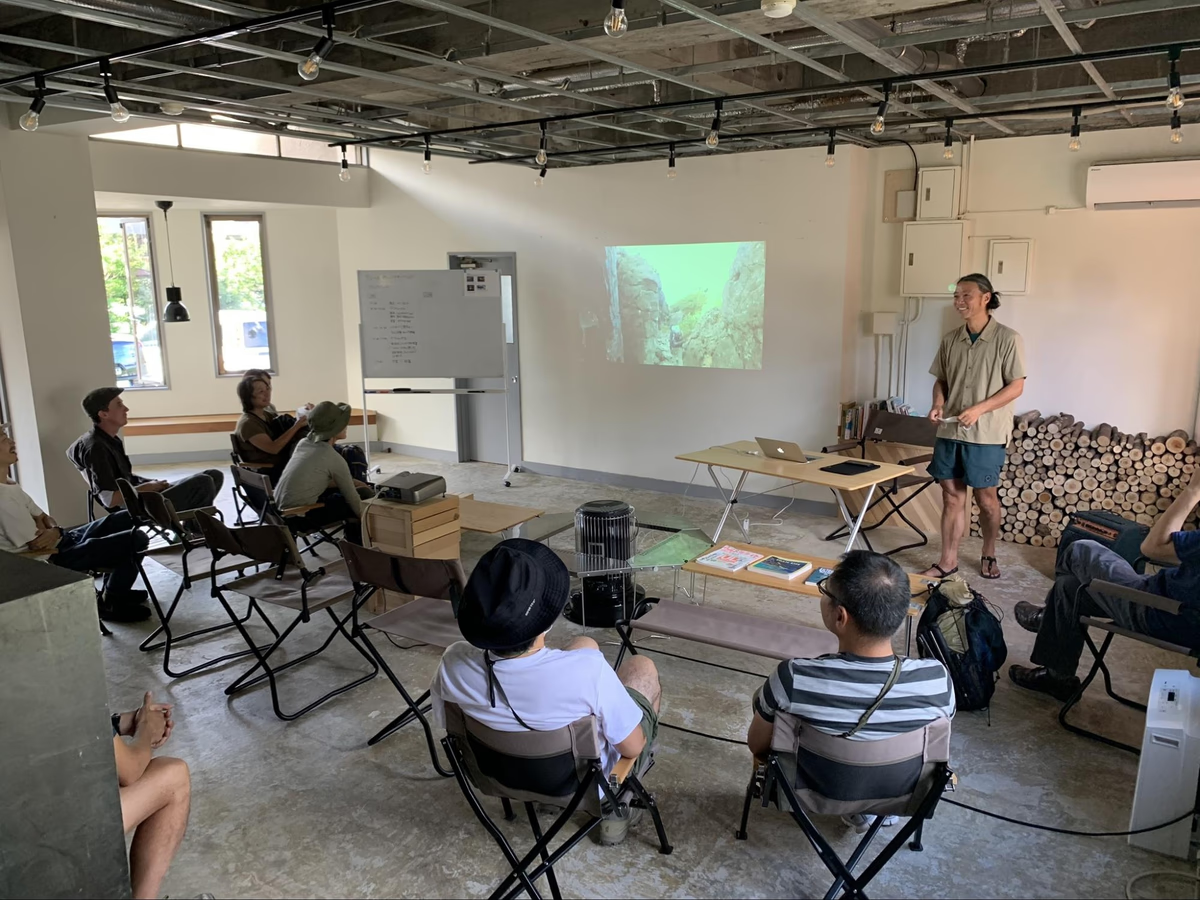
神山ハイキングクラブでは、ULハイキングに関するレクチャーもして頂いた
自分が活躍するポジション「豊嶋はそこで使ったほうがお得」
原澤:豊嶋さんは、相手のことももちろん見ているけど、自分が何に長けていて何をやっていくべきなのか。よく見えていて、自分のことがわかっていますよね。
豊嶋:小中学校、僕はサッカー部だったからね。
原澤:サッカー部だとどう違うんですか!?
豊嶋:足が速かったらウィングとかやればいいし。
原澤:あ、ポジションの話ですね。
豊嶋:サッカーの場合は、「ミッドフィルダーは何をすればいいか」が決まってるよね。そこに得意なことやキャラクターがあって、それがチームの特徴になったり、それによって違う戦略を作れたりするけど、基本的には、そのポジションはそこに適正のある人がやるべきでしょ。スポーツの場合は絶対そうする。それと同じと思う。
杉本:自分の得意とかこれをやるほうがいいっていうのは、大人になってから今の仕事につながるところでは、どんな風に掴んでいるんですか?
豊嶋:今回の一緒にやったWORK101のプロジェクトでいうと、原澤くんが会ってすぐにWORK101について説明してくれたんだけど。「最終的にモノサスとしてこういう投資をするから、こういう収益に返してくれって言われたら僕にはできないよ」って言ったのね。そのビジネスの部分は僕は苦手だから。そこはできませんってちゃんと言うことは大事かと思ってる。できない仕事を受けてしまわないっていうか。
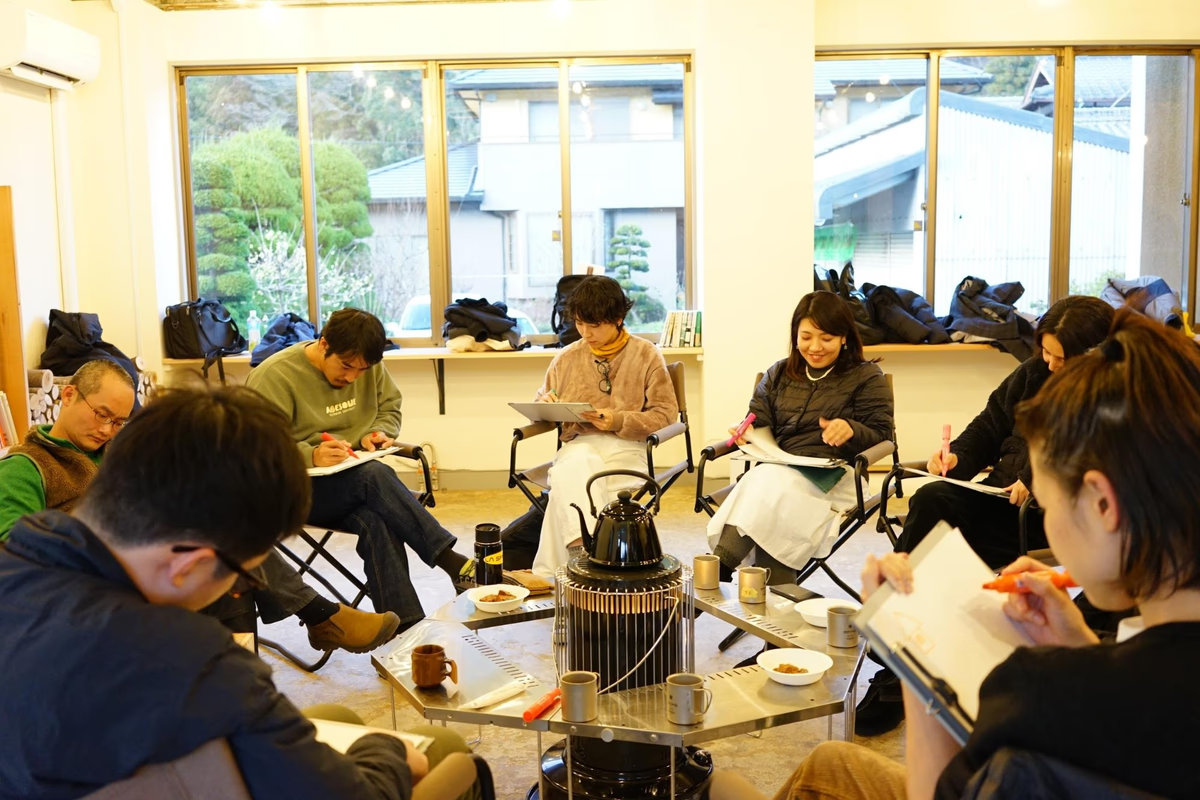
「はたらく文化を探求する」をテーマに活動するWORK101が企画した企業向け合宿の様子
原澤:そう、僕が説明をしたらすぐに「うん、わかった」って言ってくれて。「僕はビジネスに展開するのは苦手だから、事業化するのは任せた」って言ってくれて。今思うと、すごく助かりました。
豊嶋:アイデアを持っている人と、そのアイデアから利益を生む人っていうのは、別の人でもいいと思う。だってさ、僕が、そこでプランナーぶって、「こういうビジネスモデルはどう?」って提案しはじめたら逆に効率悪くなっちゃう。
苦手なことを自分の仕事の範囲にしちゃうと、うまくいかない時に相手も悶々とするだろうしさ。それより「そこ、豊嶋さんに頼むべきことじゃない」て最初から思ってくれている方が、たぶんどっちにとってもいいと思う。で、僕にできないことをサポートする人が必要なのであれば、できる人に入ってもらったらいいんじゃないかと。
杉本:自分にはできないことを他の人にお願いすることは、自分がやりたくてできることに集中する環境をつくっているってことでもありますよね。
豊嶋:裏を返せばそうなるね。「豊嶋はそこで使ったほうがお得ですよ」って言ってるっていうか。僕が楽しんでできるプロジェクトならけっこう安い値段でもやるだろうし、アイデアもボンボン出したりもするし。そういった自由な環境のなかで一緒に楽しんでやれるほうが、豊嶋の使い方としてははお得だと思うよね。(笑)
やってよかった、助かった、ひとりでできなかったことができるようになったとか、相手にメリットがあるところに、自分の得意なことや興味の向いているものをマッチさせたほうが、お互いにとっていい結果を生みやすいよね。
豊嶋さんの仕事の喜びは「人ありき」
杉本:豊嶋さんからは「僕はこういうことがやりたくて」とか「僕は社会にこういう影響を与えたい」とかそういう話は出てきていないなと思っていて。どちらかというと、一緒に仕事をする相手の人がハッピーになる話が多いですね。そこがすごく大事なところな気がしています。
豊嶋:そうかもしれないですね。
杉本:ご自身の仕事の喜びみたいなものは、どこで感じられているんですか。
豊嶋:うーん、なんか子供の頃の公園で遊んでるのと一緒と思っていて。みんなが楽しい遊びを考えるのが好き、みたいなところがあると思う。男の子も女の子も、小さい子も大きい子もいて、そこにいる全員が最後まで飽きずに「またやりたいね」と思えるような遊び方をつくったほうが全員楽しいよね。それってたぶん仕事でも一緒で。
営利事業をやるうえでは、全然儲からなかったらみんなハッピーじゃないしさ。
それならば、これくらい儲けたいっていう設定に向き合って、自分たちのアイデアとか自分のできることを合わせたときに、できるようなやり方をつくったほうがきっと良い。できない収益目標みたいなのと、できないメンバーでやっても、たぶんできないし、ハッピーな結果にはならない。
僕はよく「人ありき」って言うんだけど。
例えば、「これくらいの売り上げの事業をつくる」みたいな会社のミッションが先にあったとして、それに対して人を配置して走りはじめたとする。それがうまくいかないと、担当者や取引先を変えたりするよね。ミッションを達成させるために首のすげ替えみたいなのをやり続けていると、一番大切なのはミッションであって、関わっている自分たちではないって状況になる。
それより、ここに原澤くんという営業職をやっていて、ハイキングにハマっている31歳の人がいる。そこに、僕とライターの杉本さんもいて、三人で何ができるか考えてみるほうが、成功率の高いプロジェクトができると思う。
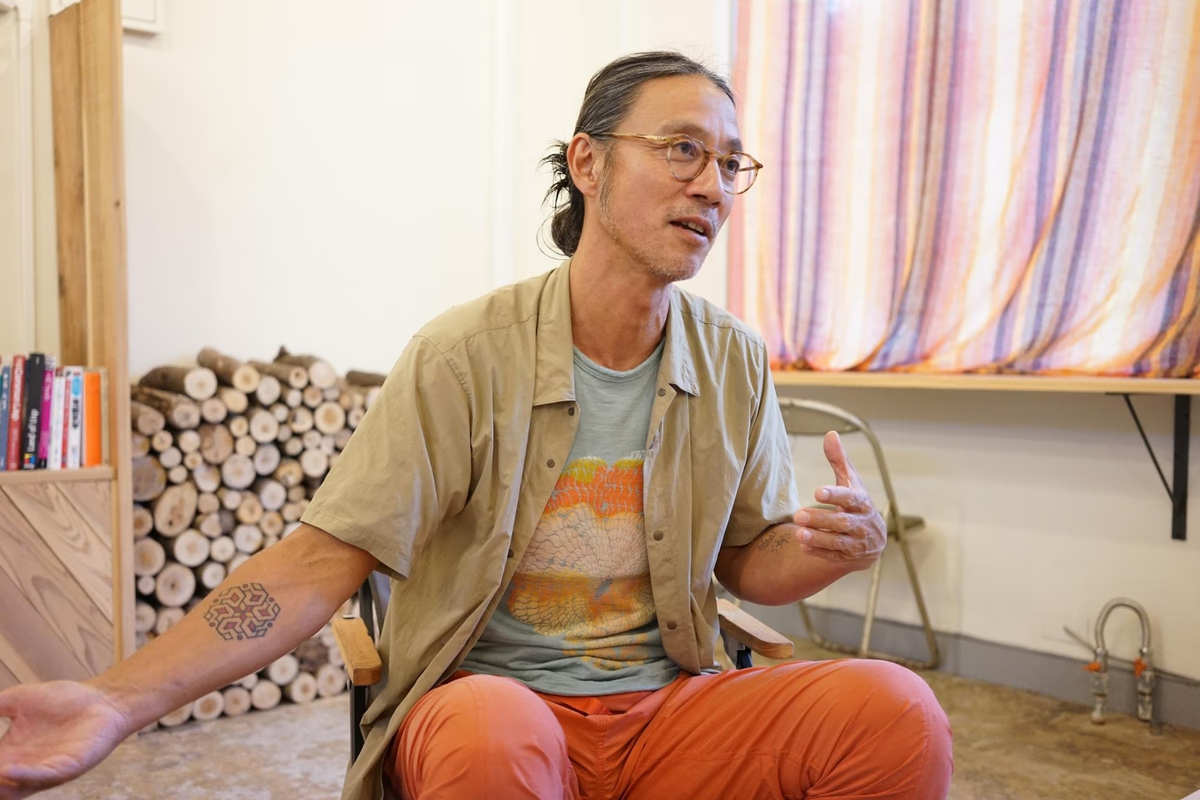
原澤:ああ……それは最高にハッピーですね。
豊嶋:とはいえ、この3人で今、年商5億円を目指すのは無理だと思う。でも、サイドビジネス的に月に10万円くらい売り上げをつくるならできるかもしれない。年間でひとり40万円ずつくらい目指すのはどう?ってなったら「できるかも!」って話になる。
何をやるかを考えるときも、たとえば、杉本さんが「ライターだから書けます」とか、僕が「アウトドアのことができます」とか、原澤くんは「営業ができます」とかさ。それぞれの能力が集まってできるプロジェクトには無理もないし、自分らの身の丈を超えたことを最初からプランしないし。成功率がすごい高いと思う。そういうことがいいなと思っている。
原澤:フィットする感じが気持ちいいですよね。最初からミッションがあって「みんなで行くぞー」って兵隊のような人が集められていく感じじゃないですよね、今の話って。それぞれ個があって。「この人たちが集まったら何ができるんだっけ」とか、「それにプラスして、どんなことがしたいんだっけ?」と考えていくと、何か見えてくる。それで見えてきた目標に向かうのは、誰でもいいわけじゃない。
働くっていうことも、そういう考え方のほうが無理がないし、続けられるだろうし。より自分たちも楽しいだろうなっていうのがイメージできます。
豊嶋:「この3人でできる」ことは、数億円稼げる事業になる可能性だってあるし、お金を稼ぐ仕事にはなれずに、お昼休みのバドミントンってことで終わるかもしれない。それはそれでいいよね。
会社内でも、新しいプロジェクトを起こすときに、最初からミッションを設定するよりは、他部署だけど仲良しな3人が「会社内でプロジェクト提案してみる?」って言って出て来たことのほうが実現率が高いような気がする反面、何を持って成功とするのかっていうのも自分たちで決めていくことになる。
ただ、プレッシャーがなさすぎても、うまくいかない可能性もあるから、場合によっては、ほどよい圧力のある関係を自分たちでつくったほうがいいかもしれないし、そうじゃなくてフリースタイルでできる感じがあるんだったら、それは会社じゃなくて外でやったほうがいいことかもしれないし。そこは、メンバーと目標のセッティング次第だと思う。
自分たちでなんかやってみようかっていうときに、「みんなで旅行に行こうよ」で終わるかもしれないし、「会社を作ろう」かもしれないし、「結婚してください」かもしれない。いろんな可能性があるだけに、それがどこに行くのかわかんないよね。でもやっぱりそれが「人ありき」ってことから始まっていたら納得できることに向かうんだと思うんだよね。
新たな解釈、ときめきの連鎖が起きる予感!?
原澤:数年前にモノサスメンバー全員でやったワークショップがあるんですが。一人一つ自分がやりたいことを紙に書いて、貼り出すんです。それで、誰かのやりたいことに乗っかってもいいんだけど、最終的にそのうちのどれかを実現しようというものでした。実際、それがきっかけで今も動いているプロジェクトがいくつかあったりしますが、実はその時僕は何も書けなかったんです。
杉本:今だったら何を書きますか?
原澤:ハイキングですね。今回豊嶋さんとの企画もそうですけど、ウルトラライト(UL)ハイキングのスタイルが、仕事にも暮らしにもピタっときていて。(※ULハイキングとは、アメリカで生まれたロングトレイルを踏破するためのハイキングスタイル。できるだけ荷物を軽くして行くことで身軽になりより遠くまで、より自然の中へ入っていける。)
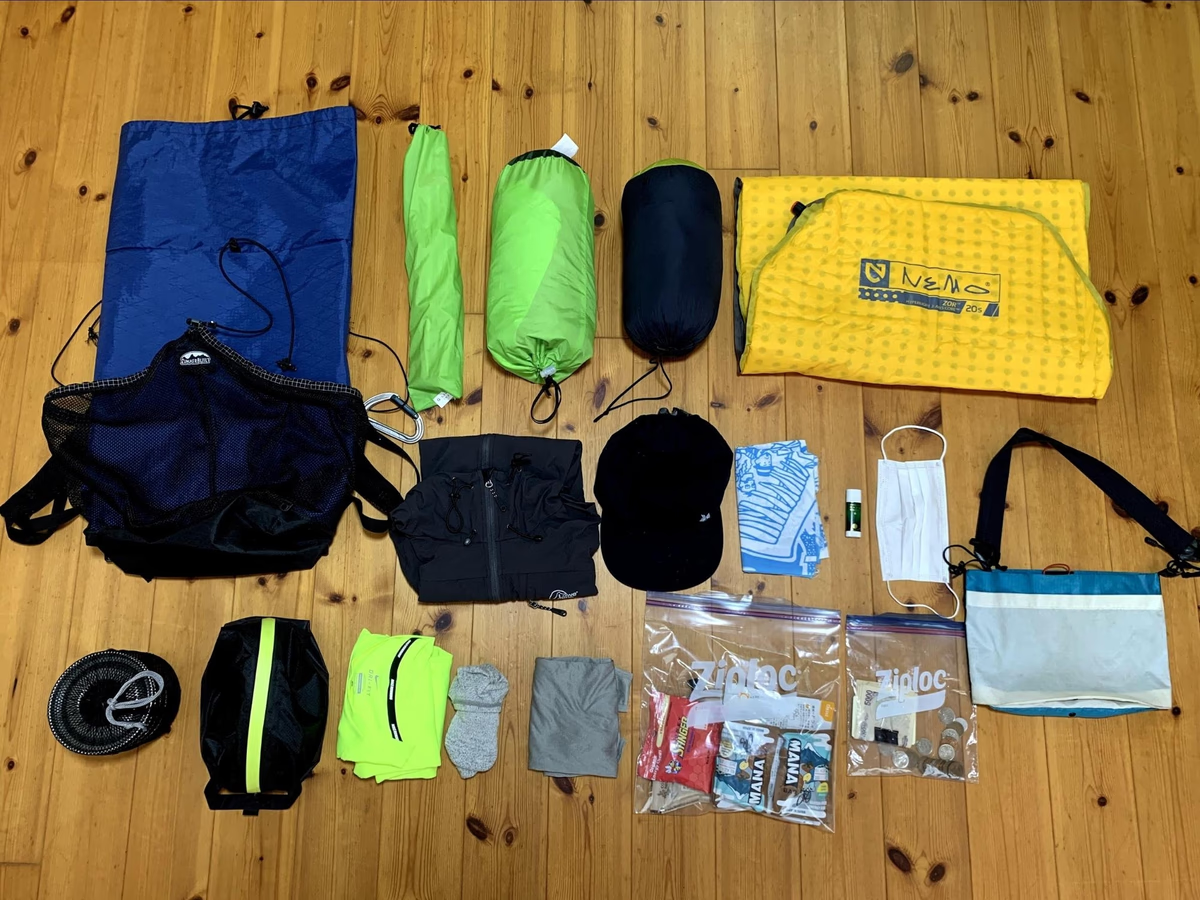
1泊2日分の荷物。本当に必要なものを必要なだけ持っていく
それによって一つ一つの選択が変わってきたし、自分が無理のない感じでやれているっていうのもある。僕はもともと浪費が激しくて。そんなにお金がいっぱいあるわけじゃないのに、オーバースペックなものや、同じものをたくさん買ったり。「そんなに靴がいるの?」とか、家族からずーっと言われているんですが。(笑)ULハイキングの考え方とか方法を聞いて、あーこれいいかもなあって最初じわっときて。本を読んだり、豊嶋さんから話を聞いたりしたらすんなり入ってきたんですよね。
最近はもっぱら山ばっかり行って、身体と心の両方でその良さを感じています。買い物をするときも、見方が変わりました。自分にフィットしている、身の丈を超えない範囲で、自分でものを選んでいる感覚があったし。
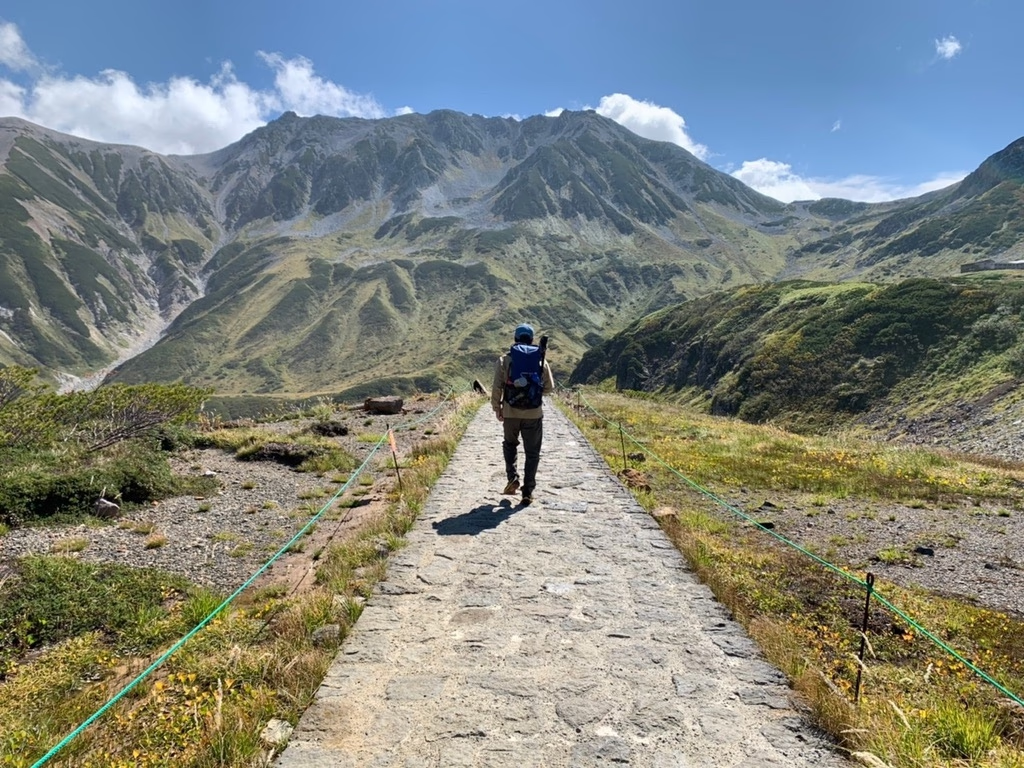
荷物が軽いと足取りも軽く、どこまででもいける気がする
杉本:世界とかモノとの関わり方が変わった?
原澤:そうですね。今回インタビューさせてもらっている「働く」というテーマでも、ULハイキングには、すごいヒントがあると思っていて。よく、豊嶋さんがおっしゃっていますけど、「本当にそんなに働きたいんだっけ?そんなにお金って必要なんだっけ?」と意識するだけでも物事は違って見えてくる。なにも考えずに高級車を選ぶのか、実際の生活があってそれに必要な車を選ぶのかはかなり違うと思っていて。
そうすると時間の過ごし方も変わる。ずっと会社にいて、働いて働いて、給料はこれだけほしいって言って稼ぐ。じゃあその稼いだお金で都心に住んでいたら、もう半分なくなっちゃうみたいなこともあったりして。「自分が本当に求めていたことは何なのか?」をふと立ち止まって考えたり。今後も変わっていきそうな可能性を感じています。
豊嶋:原澤くんは、今、「ULハイキング」っていう新しい考えにバーンって出会って、たぶんその考え方に興奮している状態だと思う。これがどんどん、毎週のように山に行ったり、休みをつくって何日もかけるような長いハイキングに行ったりとか、実践を繰り返していく中でまた自分なりの違う解釈とか出てくると思うよ。
行けば行くほど、身体で解釈していけると思う。そこをやるといいんじゃない?僕もそうだったけど、自分にとっての新しい考え方にときめくっていうのは、ファーストコンタクトとして強烈なものだけど、それだけにしておくのはもったいない。せっかく出会ったULハイキングをどんどん実践していくと、また次の自分とULハイキングとの関わりが出てくると思う。
原澤:これから、いろいろ見えてくるんだろうなあって思っています。今はすごいワクワクしていて楽しいし、どんどん実践していきたいと思っているし。実践していって「違うかも?」ってなったときも、周りには豊嶋さんや真鍋さん、林さんがいて、それについて話ができる人がいるのは、すごい贅沢だなあと思っているし、うれしいですね。すごく。
豊嶋:実践すると、ULハイキング以外の世界にもどんどんつながっていくと思うよ。次はトレイルランニングやったり、ファストパッキングとか。ULハイキングを応用したようなアクティビティはいっぱいあるから、そっちの世界に傾倒していく可能性もあるしさ。新しい考えのときめき連鎖が起こるかもしれない。
杉本:スイッチですね。
豊嶋:ひとつめのドミノはすでに押されてしまった。(笑)
原澤:またお話させてください。今日はどうもありがとうございました!
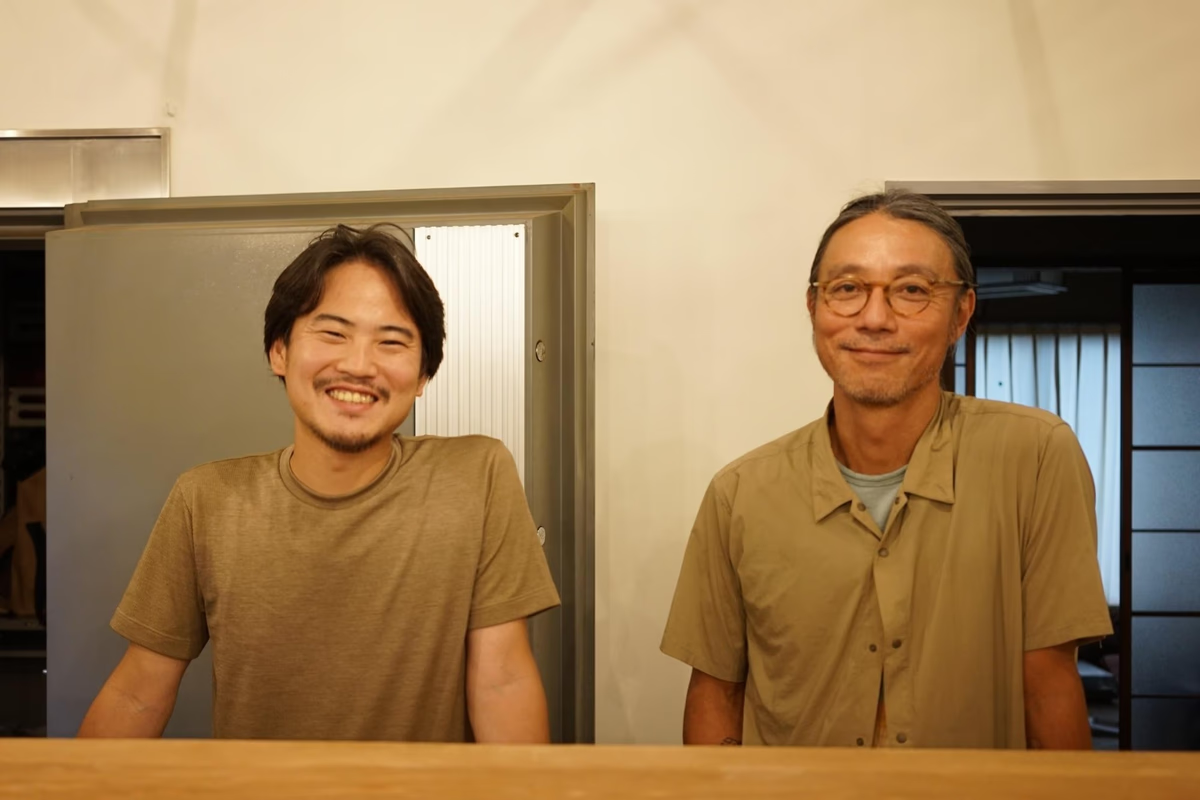
インタビュー後にパシャリ。また山へ行きましょう!
